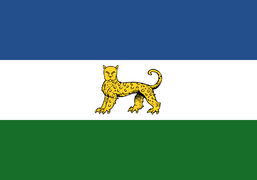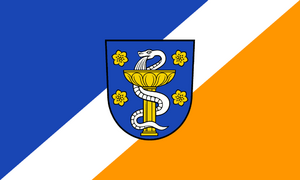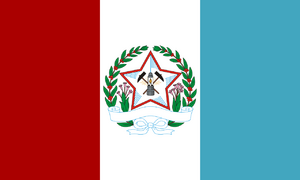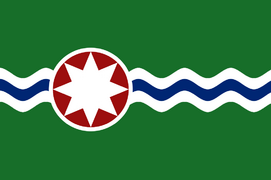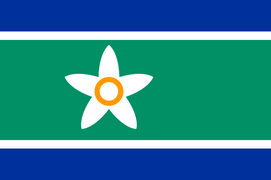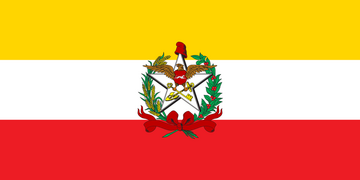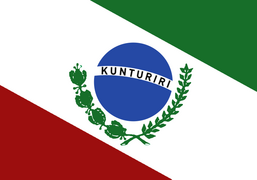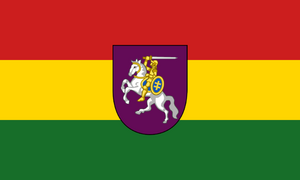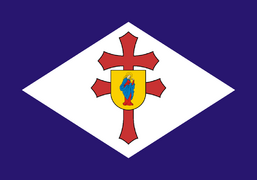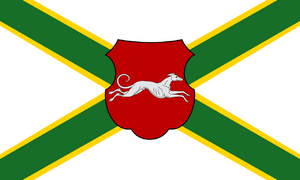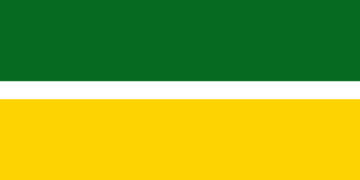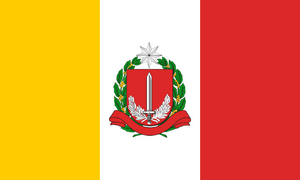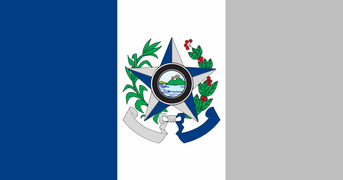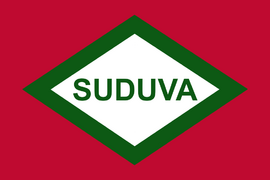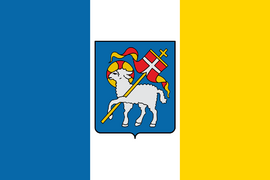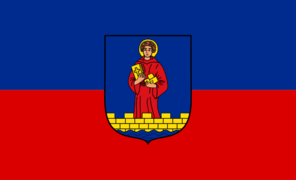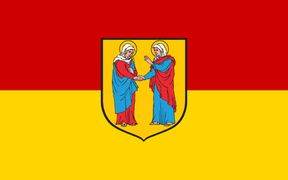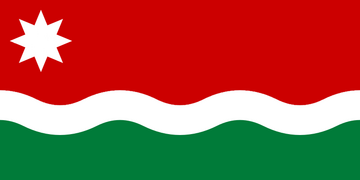Sandbox:Aucuria
Flags of Aucurian states
The flags of the states of Aucuria demonstrate a variety of trends, references, histories, and design principles, invoking a mixture of local and national symbology. Most Aucurian states first officially adopted flags in the mid-to-late 19th century, as a means of expressing local identity; some states had unofficial flags as early as the 1830s. The most recently adopted state flag is that of Kajapas, which adopted its current flag on [date].
Current flags
Historical state and territory flags
List of Aucurian state mottos
| State | Motto | Ruttish translation | Estmerish translation | Date |
|---|---|---|---|---|
| Fortitudo eius rempublicam tenet | Jo tvirtybė išlaiko respublika | His fortitude defends the republic | tbd | |
| Nemo me impune lacessit | Niekas manes nebaudžiamai neprovokuoja | No one provokes me with impunity | tbd | |
| Audemus iura nostra defendere | Mes dristame ginti savo teises | We dare defend our rights | tbd | |
| Actibus immensis patria fulget | Tėvynė spindi jos dideliais darbais | The fatherland shines by her great deeds | tbd | |
| Splendor sine occasu | Puošnuma neblėstanti | Splendor without diminishment | tbd | |
| Sic semper tyrannis | Taip visada tironams | Thus always to tyrants | tbd | |
| Florebo quocumque ferar | Aš žydėsiu kur tik mane atveš | I will flourish wherever I am brought | tbd | |
| Pergo et perago | Tesiu ir pasiekiu | I undertake and I achieve | tbd | |
| Sit nomine digna | Tegul ji yra verta vardo | May she be worthy of the name | tbd | |
| Qui transtulit sustinet | Tas kuris mus persodino, mus palaiko | He who transplanted us sustains us | tbd | |
| Ut incepit fidelis sic permanet | Kaip ji pradėjo ištikima, taip ir lieka | As she began loyal, so she remains | tbd | |
| Serit ut alteri saeclo prosit | Sėja kito amžiaus labui | One sows for the benefit of another age | tbd | |
| Semper progrediens | Visada progresuoja | Always progressing | tbd | |
| Libertates nostras pretiamus et iura nostra servamibus | Mes vertiname savo laisves ir saugosime savo teises | Our liberties we prize and our rights we will maintain | tbd | |
| Pro patria fiant eximia | Tegul tėvynei bus padaryti dideli dalykai | Let great things be done for the fatherland | tbd | |
| Nihil sine numine | Nieko be apvaizdos | Nothing without providence | tbd | |
| Pulchra terra Dei donum | Ši graži žemė yra Dievo dovana | This beautiful land is the gift of God | tbd | |
| Tandem bona causa triumphat | Galiausiai triumfuoja geras tikslas | The good cause triumphs in the end | tbd | |
| Nec luceo pluribus impar | Aš nešviečiu mažiau nei kiti | I do not shine less brightly than the others | tbd |
List of state and city nicknames in Aucuria
State nicknames
- Bendrieji Laukai
- "The Plantation State" – in reference to the state's name, which literally means "common fields" in Ruttish, and its agricultural industry
- "The Coffee State" – owing to the state's role in Aucurian coffee production
- "The Dairy State" – owing to the state's role in Aucuria's dairy industry
- "Breadbasket of Aucuria" – referencing the state's powerful agricultural industry, particularly its production of staple crops
- Cataris
- Chanchamaya
- "The Vėliavininkas State" – referring to the state's history as a destination for vėliavininkai, colonial-era fortune-seekers and explorers
- "The Wildflower State" – a reference to the variety of flower species native to the state
- "The Mineral State" – owing to the state's role in Aucuria's mining industry
- "The Iron State" – referencing the state's prominent iron mining industry
- Chucisaca
- "The Gold State" – a reference to the state's historic role in gold mining
- "The Mountain State" – owing to the state's location in the Vaskaranas Mountains
- "The Cantuta State" – a reference to the prevalence of cantuta, Aucuria's national flower, in the state
- "Cradle of Civilization" – referring to the emergence of the Pativilkas civilization, the first civilization in Asteria Inferior, within what is now Chucisaca
- Juoda
- "The Jungle State" – in reference to the Sythe-Juoda Rainforest, which dominates the state
- "The Rubber State" – referencing the state's historical rubber industry
- "The Tin State" – owing to the state's role in Aucuria's tin mining industry
- "The Great Frontier" – in reference to the state's large size, location, and history as a frontier region
- "Mother of Rivers" – in reference to the many tributaries which begin or pass through the state
- Kajapas
- Kestutia
- "The Cotton State" – referencing the state's historical cotton industry
- "The Pineapple State" – owing to the state's role in Aucurian pineapple production
- "Prince of States" – in reference to the fact that the state was named after the Ruttish monarch Kestutis III Algirdas
- Kunturiri
- Leikauskas
- "The Užkariautojas State" – in reference to the state's namesake, Ruttish užkariautojas Jurgis Leikauskas
- "The Tobacco State" – referencing the state's historical tobacco industry
- "Little Werania" – owing to the large number of Weranians who settled in what became Leikauskas during the Rudolphine period
- Magdaliete
- "The Palm Tree State" – referencing the state's location along the Arucian Sea
- "The Butterfly State" – a reference to the variety of butterfly species native to the state
- "The Patient State" – in reference to a stereotype about the inhabitants of the state
- New Ruttland
- "The Greyhound State" – in reference to the use of the greyhound as a state symbol
- "The Faithful State" – in reference to the state's motto, Ut incepit fidelis sic permanet ("as she began loyal, so she remains")
- "The Zinc State" – owing to the state's role in Aucuria's zinc mining industry
- "Cradle of the Nation" – referring to the fact that the colonization of Aucuria began with the founding of New Ruttland's capital, Apvaizda
- Oroncota
- "The Emerald State" – owing to the state's role in Aucurian emerald mining
- "The Pastoral State" – a reference to the state's prominent agricultural industry and agrarian landscapes
- Pakrashchia
- "The Vaučas State" – referring to the state's history as a hotspot for vaučai, the Aucurian equivalent of the cowboy or gaucho
- "The Soybean State" – owing to the state's role in Aucurian soybean production
- "Land of Opportunity" – in reference to the settlement of the state by immigrants from across the world seeking opportunity in the 1800s
- Sidabria
- "The Silver State" – a reference to the state's historic role in silver mining
- "Home of the Republic" – owing to the move of Aucuria's capital to Kalnaspilis during the Aucurian Revolution
- "Heart of Aucuria" – in reference to the state's central location in Aucuria and economic, political, and cultural importance
- "Locomotive of Aucuria" – in reference to the state's economic importance in Aucuria
- Suduva
- "The Volunteer State" – a reference to the supposed enthusiasm of Suduvans to volunteer to fight in the Aucurian Revolution
- "The Copper State" – owing to the state's role in Aucuria's copper mining industry
- Šventasis Silvestras
- "The Banana State" – owing to the state's role in Aucurian banana production
- "The Sailors' State" – a reference to the state's historic role in fishing and shipbuilding
- Šventasis Steponas
- Šventoji Elžbieta
- "The Sunshine State" – referring to the state's sunny weather
- "The Songbird State" – a reference to the variety of passerine bird species native to the state
- Tucatia
- "The Toucan State" – in reference to the state's name, which comes from an indigenous word meaning "toucan"
- "The Brazilwood State" – a reference to the state's historic role in brazilwood production
City nicknames
Bendrieji Laukai
Cataris
Chanchamaya
Chucisaca
Juoda
Kajapas
Kestutia
Kunturiri
Leikauskas
Magdaliete
New Ruttland
Oroncota
Pakrashchia
Sidabria
Suduva
Šventasis Silvestras
Šventasis Steponas
Šventoji Elžbieta
Tucatia
Names
The following is a list of names present in Aucurian, which is technically deprecated but I continue to use as a reference sometimes because I am lazy.
Aucurian
Abdijas - masculine - from Hebrew ovadyahu, meaning "worshiper of God"
Abigailė - feminine - from Hebrew avigayil, meaning "my father is joy"
Abijas - masculine - from Hebrew aviyahu, meaning "my father is Jehova"
Abšalomas - masculine - from Hebrew avshalom, meaning "my father is peace"
Abroamas - masculine - from Hebrew avraham, meaning "high father"
Adomas - masculine - from Hebrew adamah, meaning "the soil"
Adrianas - masculine - from Venetic adur via Latin adria, meaning "water"
Afanasijos - masculine - from Greek athanasios, meaning "immortal"
Agnė - feminine - from Greek hagne, meaning "holy"
Agota - feminine - from Greek agathos, meaning "good"
Agrypina - feminine - from Greek agrios hippos, meaning "wild horse"
Aivaras - masculine - from Aucuric aivaras, of unclear meaning
Albertas - masculine - from Germanic adalberaht, meaning "noble and bright"
Albionas - masculine - from Latin albanus, meaning "white"
Aldona - feminine - from Aucuric aldona, of unclear meaning
Aleirikas - masculine - from Germanic alareiks, meaning "all-ruler"
Aleksandras - masculine - from Greek alexandros, meaning "defender of mankind"
Alfiejus - masculine - from Aramaic hilfai via Greek alphaios, meaning "changing"
Alfonsas - masculine - from Germanic adalfuns, meaning "noble and ready"
Alfredas - masculine - from Old English aelfraed, meaning "elven advice"
Alfrikas - masculine - from Old English aelfric, meaning "elven rule"
Algimantas - masculine - from Aucuric algimantas, of unclear meaning
Algirdas - masculine - from Norse holmgeirr, meaning "island spear"
Alisa - feminine - from Germanic adalheidis, meaning "of the noble sort"
Alvinas - masculine - from Old English aelfwine, meaning "friend to elves"
Amadėjus - masculine - from Latin amadeus, meaning "love of God"
Amalija - feminine - from Germanic amala, meaning "industrious"
Amanda - feminine - from Latin amandus, meaning "lovable"
Ambraziejus - masculine - from Greek ambrosios, meaning "immortal"
Anakletas - masculine - from Greek anakletos, meaning "invoked"
Anastašija - feminine - from Greek anastasios, meaning "resurrection"
Anatolijus - masculine - from Greek anatolios, meaning "sunrise"
Ansas - masculine - from Hebrew yehohanan via Latin iohannes & Germanic hans, meaning "God is gracious"
Antanas - masculine - from Latin antonius, meaning "praiseworthy"
Apālidaris - masculine - from Greek apollodoros, meaning "gift of Apollo"
Aras - masculine - from Aucuric erelis, meaning "eagle"
Arėjas - masculine - from Hebrew aryeh, meaning "lion"
Arkādijus - masculine - from Greek arktos, meaning "bear"
Aronas - masculine - from Hebrew aharon, of unknown meaning
Arsenijaus - masculine - from Greek arsenios, meaning "virile"
Artemijus - masculine - from Greek artemisios, meaning "dedicated to Artemis"
Artūras - masculine - from Celtic arthos rig, meaning "bear king"
Arvydas - masculine - from Norse arnvithr, meaning "eagle's tree"
Asbiornas - masculine - from Norse assbjornr, meaning "bear of the gods"
Astridė - feminine - from Norse assfrithr, meaning "beloved of the gods"
Audra - feminine - from Aucuric audra, meaning "storm"
Augustas - masculine - from Latin augustus, meaning "venerable"
Augustinas - masculine - from Latin, derived from augustus, meaning "venerable"
Aurelijus - masculine - from Latin aureus, meaning "gilded"
Aurora - feminine - from Latin aurora, meaning "dawn"
Aušra - feminine - from Aucuric ausra, meaning "dawn"
Austėja - feminine - from Aucuric austeja, meaning "to weave"
Ąžuolas - masculine - from Aucuric azuolas, meaning "oak tree"
Baldvinas - masculine - from Germanic baldwin, meaning "brave friend"
Baltramiejus - masculine - from Aramaic bar talmai via Greek bartholomaios, meaning "son of Talmai"
Barbora - feminine - from Greek barbaros, meaning "foreign"
Baručas - masculine - from Hebrew barukh, meaning "blessed"
Beata - feminine - from Latin beatus, meaning "blessed"
Beatričė - feminine - from Latin viatrix, meaning "female traveler"
Beferlija - feminine - from Old English beferleah, meaning "beaver clearing"
Belšacaras - masculine - from Akkadian bel-sarra-usur via Hebrew belshazzar, meaning "Baal protect the king"
Bendiktas - masculine - from Latin benedictus, meaning "blessed"
Bernardas - masculine - from Germanic bernhard, meaning "brave bear"
Berta - feminine - from Norse behraht, meaning "bright"
Betela - feminine - from Hebrew beit el, meaning "house of God"
Binjaminas - masculine - from Hebrew binyamin, meaning "son of the south"
Birutė - feminine - from Aucuric birute, of unclear meaning
Blēzas - masculine - from Latin blasius, meaning "lisping"
Bogdanas - masculine - from Slavic bogudan, meaning "given by God"
Boleslovas - masculine - from Slavic bolyeslava, meaning "greater glory"
Bonifacas - masculine - from Latin bonum fatum, meaning "good fate"
Borisas - masculine - from Atlic bogoris via Slavic boris, of unclear meaning
Borghildė - feminine - from Norse borghildr, meaning "battle fortification"
Brendanas - masculine - from Celtic breanainn, meaning "prince"
Brigita - feminine - from Celtic brighid, meaning "exalted one"
Bronislovas - masculine - from Slavic bornaslava, meaning "protected glory"
Brunhildė - feminine - from Norse brynhildr, meaning "protection in battle"
Butautas - masculine - from Aucuric butautas, of unclear meaning
Butegeidis - masculine - from Aucuric butegeidis, of unclear meaning
Butvydas - masculine - from Aucuric butvydas, of unclear meaning
Čečilija - feminine - from Latin, derived from caecus, meaning "blind"
Cedricas - masculine - from Celtic caradog via Old English cerdic, meaning "love"
Celestinas - masculine - from Latin, derived from caelestus, meaning "heavenly"
Česlavas - masculine - from Slavic chistislava, meaning "glorious honor"
Dafnė - feminine - from Greek daphne, meaning "laurel"
Daglasas - masculine - from Celtic dubhglas, meaning "dark river"
Dagnija - feminine - from Norse dagrny, meaning "new day"
Daina - feminine - from Aucuric daina, meaning "song"
Daiva - feminine - from Aucuric daiva, of unclear meaning
Dalia - feminine - from Aucuric dalia, meaning "luck"
Danielis - masculine - from Hebrew daniyel, meaning "God is my judge"
Danutė - feminine - from Latin donatus, meaning "given"
Darijus - masculine - from Persian darayavahush via Greek dareios, meaning "holding goodness firm"
Daujotas - masculine - from Aucuric daujotas, of unclear meaning
Daumantas - masculine - from Aucuric daugmantus, meaning "very intelligent"
Demetrijus - masculine - from Greek demetrios, meaning "devoted to Demeter"
Debora - feminine - from Hebrew devorah, meaning "honeybee"
Deziderijus - masculine - from Latin desiderius, meaning "desire"
Detmaras - masculine - from Germanic theudmeri, meaning "famous people"
Dianė - feminine - from Indo-European dyeus, meaning "divine"
Dionīzijas - masculine - from Greek dionysios, meaning "devoted to Dionysus"
Dobijeslovas - masculine - from Slavic dobieslava, meaning "brave glory"
Dobroslovas - masculine - from Slavic dobroslava, meaning "good glory"
Dominykas - masculine - from Latin dominicus, meaning "of the Lord"
Dominaldas - masculine - from Celtic domhnall, meaning "ruler of the world"
Donatas - masculine - from Latin donatus, meaning "given"
Dolorė - feminine - from Latin dolors, meaning "sorrows"
Doroteja - feminine - from Greek dorotheos, meaning "gift of God"
Dovydas - masculine - from Hebrew dawit, meaning "beloved"
Džefrijas - masculine - from Germanic walhafrid, meaning "foreign peace"
Džeinė - feminine - from Hebrew yehohanan via Latin iohannes, meaning "God is gracious"
Dženevyvė - feminine - from Celtic genovefa, of unclear meaning
Džeraldas - masculine - from Germanic gerwald, meaning "spear rule"
Edgaras - masculine - from Old English eadgar, meaning "wealthy spear"
Edita - feminine - from Old English eadgyth, meaning "fortune of war"
Edivydas - masculine - from Old English gedvydas, of unclear meaning
Edmundas - masculine - from Old English eadmund, meaning "rich protection"
Eduardas - masculine - from Old English eadweard, meaning "rich guard"
Efraimas - masculine - from Hebrew efrayim, meaning "fruitful"
Eglė - feminine - from Aucuric egle, meaning "spruce tree"
Ehudas - masculine - from Hebrew ehud, meaning "united"
Eimuntas - masculine - from Aucuric eimuntas, of unclear meaning
Einaras - masculine - from Norse einarr, meaning "lone warrior"
Eleonora - feminine - from Occitan alienor, of unclear meaning
Eleuterijus - masculine - from Greek eleftherios, meaning "free"
Eligija - feminine - from Latin eligere, meaning "to choose"
Eivelinė - feminine - from Germanic avi, meaning "desired"
Eliezeris - masculine - from Hebrew eliezer, meaning "God is my help"
Elijas - masculine - from Hebrew eliyahu, meaning "my God is Jehova"
Elita - feminine - from Aucuric elita, of unclear meaning
Elvira - feminine - from Germanic alawer, meaning "all true"
Elžbieta - feminine - from Hebrew elisheva, meaning "my god is an oath"
Emerikas - masculine - from Germanic ermeric, meaning "all-ruler"
Emilijus - masculine - from Latin aemulus, meaning "rival"
Emmanuelis - masculine - from Hebrew immanuel, meaning "God is with us"
Endrijūs - masculine - from Greek andros, meaning "man"
Erazmas - masculine - from Greek erasimos, meaning "beloved"
Eirikas - masculine - from Norse eirikr, meaning "eternal ruler"
Ermengilda - feminine - from Germanic hermengild, meaning "complete sacrifice"
Ernvaldas - masculine - from Germanic arnwald, meaning "eagle's power"
Eslija - feminine - from Old English aescleah, meaning "ash clearing"
Estera - feminine - from Persian ishtar, meaning "star"
Ernestas - masculine - from Germanic eornost, meaning "serious"
Ervinas - masculine - from Germanic hariwini, meaning "friend of the army"
Etanas - masculine - from Hebrew eitan, meaning "enduring"
Etelredas - masculine - from Old English aethelraed, meaning "noble advice"
Etelwulfas - masculine - from Germanic adalwolf, meaning "noble wolf"
Eufemija - feminine - from Greek euphemia, meaning "good speaker"
Eugenijus - masculine - from Greek eugenios, meanig "well-born"
Eustatijus - masculine - from Greek eustathios, meaning "well-built"
Euvaristos - masculine - from Greek euarestos, meaning "very pleasing"
Euzebijos - masculine - from Greek eusebios, meaning "pious"
Ezavas - masculine - from Hebrew esaw, meaning "hairy"
Ezečielis - masculine - from Hebrew yechezqel, meaning "God strengthens"
Ezekias - masculine - from Hebrew chizqiyahu, meaning "God strengthens"
Ezras - masculine - from Hebrew ezra, meaning "help"
Faustas - masculine - from Latin faustus, meaning "auspicious"
Fėbė - feminine - from Greek phoibe, meaning "pure"
Fedra - feminine - from Greek phaidros, meaning "bright"
Felicija - feminine - from Latin felicitas, meaning "lucky"
Feliksas - masculine - from Latin felix, meaning "lucky"
Ferdinandas - masculine - from Germanic fardinand, meaning "daring journey"
Fidelis - masculine - from Latin fidelis, meaning "faithful"
Filomena - feminine - from Greek philomenos, meaning "friend of strength"
Florianas - masculine - from Latin florus, meaning "flower"
Frīdrikas - masculine - from Germanic fridric, meaning "peaceful ruler"
Fulgencijos - masculine - from Latin fulgens, meaning "shining"
Gabija - feminine - from Aucuric gaubti, meaning "to cover"
Gabrielus - masculine - from Hebrew gavriel, meaning "God is my strong man"
Galenas - masculine - from Greek galenos, meaning "calm"
Gaudimantė - feminine - from Aucuric gaudimante, of unclear meaning
Gedolijas - masculine - from Hebrew gedalyahu, meaning "God is great"
Gediminas - masculine - from Aucuric gedeti, meaning "to grieve"
Gedvilas - masculine - from Aucuric gedvilas, of unclear meaning
Gelertas - masculine - from Germanic gelthardt, meaning "strong pay"
Genadijus - masculine - from Greek gennadios, meaning "generous"
Gervasijos - masculine - from Germanic ger via Latin gervasius, meaning "spear"
Gertrūda - feminine - from Germanic gerthrud, meaning "strong spear"
Getsemanė - feminine - from Aramaic get shmane, meaning "oil press"
Glebas - masculine - from Norse guthleifr via Slavic gleb, meaning "heir of the gods"
Gideonas - masculine - from Hebrew gedon, meaning "hewer"
Giedrė - feminine - from Aucuric giedras, meaning "serene"
Ginevra - feminine - from Celtic gwenhwyfar, meaning "fair-haired"
Gintarė - feminine - from Aucuric gintaras, meaning "amber"
Gnievomieras - masculine - from Slavic gniewomiru, meaning "angry world"
Godyva - feminine - from Old English godgyfu, meaning "gift of God"
Goštautas - masculine - from Aucuric gostautas, of unclear meaning
Gvidas - masculine - from Germanic witu, meaning "wood"
Grażyna - feminine - from Aucuric grazyna, meaning "beautiful"
Grėtė - feminine - from Greek margarites via Germanic greta, meaning "pearl"
Grigorijus - masculine - from Greek gregos via Latin gregorius, meaning "alert"
Gunhildė - feminine - from Norse gunnhildr, meaning "battle and war"
Gustavas - masculine - from Norse gautstafr, meaning "staff of the Geads"
Habakukas - masculine - from Hebrew chavaquq, meaning "entrance"
Hakonas - masculine - from Norse hakonr, meaning "high son"
Haroldas - masculine - from Old English hereweald, meaning "powerful army"
Hefciba - feminine - from Hebrew heftsivah, meaning "my delight is in her"
Hektoras - masculine - from Greek, derived from ekhein, meaning "to restrain"
Helga - feminine - from Norse heilagr, meaning "holy"
Helmutas - masculine - from Germanic helmuot, meaning "courageous will"
Henrikas - masculine - from Germanic heimric, meaning "home ruler"
Heraklėjas - masculine - from Greek herakles, meaning "glory of Hera"
Heronīmas - masculine - from Greek hieronymos, meaning "sacred name"
Hlojė - feminine - from Greek khloe, meaning "green shoot"
Ieva - feminine - from Hebrew chawah, meaning "to breathe"
Ignacas - masculine - from Etruscan egnat via Latin ignatius, meaning "fire"
Igoris - masculine - from Norse yngvarr via Russian igor, meaning "warrior of Yngvi"
Ildefonsas - masculine - from Germanic hildfuns, meaning "battle-ready"
Ilena - feminine - from Greek helene, meaning "torch"
Ingridė - feminine - from Norse ingrithr, meaning "Ingwaz is beautiful"
Inocenzas - masculine - from Latin innocentius, meaning "innocent"
Irēna - feminine - from Greek eirene, meaning "peace"
Irēnėjus - masculine - from Greek eirenaios, meaning "peaceful"
Ivanas - masculine - from Hebrew yehohanan via Latin iohannes, meaning "God is gracious"
Izaijas - masculine -from Hebrew yeshayahu, meaning "God is salvation"
Izidoriaus - masculine - from Greek isidoros, meaning "gift of Isis"
Izmaēlis - masculine - from Hebrew yishmael, meaning "God will hear"
Izoakas - masculine - from Hebrew yitzhak, meaning "he laughs"
Jadvyga - feminine - from Germanic hadewig via Slavic jadwiga, meaning "combat in war"
Jaropolkas - masculine - from Slavic yarupulku, meaning "fierce people"
Jaroslavas - masculine - from Slavic yaruslava, meaning "fierce glory"
Jasna - feminine - from Slavic jasna, meaning "sharp"
Jasonas - masculine - from Greek, derived from iasthai, meaning "to heal"
Jaunutis - masculine - from Aucuric jaunutis, meaning "young man"
Jedidijas - masculine - from Hebrew yehdidyahu, meaning "beloved of God"
Jekatyrīna - feminine - from Greek hekateros, meaning "each of the two"
Jemima - feminine - from Hebrew yemima, meaning "dove"
Jeremijas - masculine - from Hebrew yirimyahu, meaning "God has uplifted"
Jesė - masculine - from Hebrew yishay, meaning "gift"
Joačimas - masculine - from Hebrew yehoyakim, meaning "raised by God"
Jogaila - masculine - from Aucuric jogaila, meaning "strong rider"
Jokūbas - masculine - from Hebrew yaakov, meaning "supplanter"
Jolanta - feminine - from Greek iolanthos, meaning "purple flower"
Jonas - masculine - from Hebrew yehohanan via Latin iohannes, meaning "God is gracious"
Jonaš - masculine - from Hebrew yonah, meaning "dove"
Jonetanas - masculine - from Hebrew yehonatan, meaning "God has given"
Jozijas - masculine - from Hebrew yoshiyahu, meaning "God supports"
Jozuė - masculine - from Hebrew yehoshua, meaning "God is salvation"
Judė - masculine - from Hebrew yehudah, meaning "praised"
Juliaus - masculine - from Latin julius, meaning "downy-bearded"
Juozapas - masculine - from Hebrew yosef, meaning "he will add"
Juošafatas - masculine - from Hebrew yehoshafat, meaning "God has judged"
Jūratė - feminine - from Aucuric jura, meaning "ocean"
Jurgis- masculine - from Greek georgios, meaning "farmer"
Justinas - masculine - from Latin justus, meaning "just"
Kaelėja - feminine - from Celtic ceilidh, meaning "dance"
Kaetanas - masculine - from Latin caietanus, meaning "from Caieta"
Kajus - masculine - from Etruscan cai via Latin gaius, of unclear meaning
Kalikstas - masculine - from Greek kallistos, meaning "most beautiful"
Kamilė - feminine - from Latin camillus, of unclear meaning
Karigaila - masculine - from Aucuric karigaila, of unclear meaning
Karijotas - masculine - from Aucuric karijotas, of unclear meaning
Karolis - masculine - from Germanic karl, meaning "man"
Kasandra - feminine - from Greek kassandra, meaning "shining upon man"
Kastytis - masculine - from Aucuric kastytis, of unclear meaning
Kasperas - masculine - from Persian gizbar via Latin caspar, meaning "treasurer"
Kazimieras - masculine - from Slavic kazitimiru, meaning "to destroy peace"
Kineadas - masculine - from Celtic cinead, meaning "handsome"
Kęsgaila - masculine - from Aucuric kesgaila, meaning "patient strength"
Kęstutis - masculine - from Aucuric kesti, meaning "to cope"
Klaudijus - masculine - from Latin claudus, meaning "crippled"
Klara - feminine - from Latin clarus, meaning "clear"
Klemensas - masculine - from Latin clemens, meaning "gentle"
Kiprijas - masculine - from Latin cyprianus, meaning "from Cyprus"
Kirilas - masculine - from Greek kyrios, meaning "lord"
Kolinas - masculine - from Celtic coilean, meaning "young pup"
Konanas - masculine - from Celtic cu, meaning "wolf"
Konradas - masculine - from Germanic kuoniradas, meaning "brave advice"
Konstantinas - masculine - from Latin, derived from constans, meaning "steadfast"
Kristijonas - masculine - from Latin christianus, meaning "Christian"
Kristupas - masculine - from Greek christophoros, meaning "bearer of Christ"
Ksaveras - masculine - from Basque etxaberri, meaning "the new house"
Laima - feminine - from Aucuric laima, meaning "luck"
Larisa - feminine - from Greek larissa, meaning "citadel"
Lauma - feminine - from Aucuric lauma, of unclear meaning
Laurynas - masculine - from Latin laurentius, meaning "from Laurentum"
Leandras - masculine - from Greek leandros, meaning "lion of a man"
Lečas - masculine - from Slavic lech, of unclear meaning
Lėja - feminine - from Hebrew leah, meaning "weary"
Lemuelis - masculine - from Hebrew lemuel, meaning "belonging to God"
Lengvenis - masculine - from Aucuric lengvenis, of unclear meaning
Leofvynas - masculine - from Old English leofwine, meaning "dear friend"
Leonardas - masculine - from Germanic levonhard, meaning "brave lion"
Leopoldas - masculine - from Germanic leudbald, meaning "bold person"
Letitija - feminine - from Latin laetitia, meaning "joy"
Lidija - feminine - from Greek lydia, meaning "from Lydia"
Lilija - feminine - from Latin lilium, meaning "lily"
Lilita - feminine - from Akkadian lilitu, meaning "of the night"
Linas - masculine - from Greek linos, meaning "flax"
Linda - feminine - from Germanic linde, meaning "soft"
Liora - masculine - from Hebrew lior, meaning "light"
Liubartas - masculine - from Aucuric liubartas, of unclear meaning
Liucija - feminine - from Latin lux via Latin lucius, meaning "light"
Liudmila - feminine - from Slavic lyudumilu, meaning "gracious people"
Liudvikas - masculine - from Germanic hlodwig, meaning "famous war"
Liuteras - masculine - from Germanic liutheri, meaning "people's army"
Livija - feminine - from Latin lividus, meaning "envious"
Loreta - feminine - from Latin laurus, meaning "laurel"
Lozorias - masculine - from Hebrew elazar via Greek lazaros, meaning "God has helped"
Lukas - masculine - from Greek loukas, meaning "from Lucania"
Lysandras - masculine - from Greek lysandros, meaning "liberator of mankind"
Madara - feminine - from Aucuric madara, meaning "bedstraw flower"
Magdalietė - feminine - from Greek magdalini, meaning "of Magdala"
Maksymas - masculine - from Latin maximus, meaning "greatest"
Maksymiljanas - masculine - from Latin, derived from maximus, meaning "greatest"
Malcolmas - masculine - from Celtic mael coluim, meaning "follower of Saint Columba"
Manasas - masculine - from Hebrew menase, meaning "causing to forget"
Manvydas - masculine - from Aucuric manvydas, of unclear meaning
Margarita - feminine - from Greek margarites, meaning "pearl"
Margiris - masculine - from Aucuric margiris, of unclear meaning
Marija - feminine - from Hebrew miryam via Greek maria, meaning "rebellion"
Marijos - masculine - from Latin marius, meaning "devoted to Mars"
Markus - masculine - from Latin marcus, meaning "devoted to Mars"
Martynas - masculine - from Latin martinas, meaning "devoted to Mars"
Melanija - feminine - from Greek melania, meaning "dark"
Metjūs - masculine - from Hebrew mattiyahu via Greek matthaios, meaning "gift of God"
Metodijaus - masculine - from Greek methodios, meaning "with a method"
Mečislovas - masculine - from Slavic mechislava, meaning "glory of the sword"
Miervaldis - masculine - from Aucuric miervaldis, meaning "peaceful rule"
Miglė - feminine - from Aucuric migla, meaning "mist"
Milda - feminine - from Aucuric milda, of unclear meaning
Mildreda - feminine - from Germanic mildthryth, meaning "gentle strength"
Milisenta - feminine - from Germanic amalasuintha, meaning "strong labor"
Miloslovas - masculine - from Slavic miluslava, meaning "gracious glory"
Mindaugas - masculine - from Aucuric mindaugas, meaning "famous wisdom"
Mistislavas - masculine - from Slavic mstislava, meaning "glorious vengeance"
Mladenas - masculine - from Slavic mlad, meaning "young"
Modestas - masculine - from Latin modestus, meaning "restrained"
Monika - feminine - from Latin moneo, meaning "advisor"
Mordečajas - masculine - from Persian marduka via Hebrew mordekhay, meaning "servant of Marduk"
Morta - feminine - from Hebrew martha, meaning "mistress"
Mozė - masculine - from Egyptian mes via Hebrew mosheh, meaning "son"
Mykolas - masculine - from Hebrew mikhael, meaning "who is like God?"
Nadija - feminine - from Slavic nadyezhda, meaning "hope"
Naftalis - masculine - from Hebrew naftali, meaning "my struggle"
Naomė - feminine - from Hebrew naomiy, meaning "pleasantness"
Narimantas - masculine - from Aucuric narimantas, of unclear meaning
Nataša - feminine - from Latin natalis via Slavic natasha, meaning "Christmas"
Nehemijas - masculine - from Hebrew nechemayahu, meaning "comforted by God"
Netanielius - masculine - from Hebrew netanel, meaning "God has given"
Nikiforas - masculine - from Greek nikephoros, meaning "bringer of victory"
Nikolajus - masculine - from Greek nikolaus, meaning "victory of the people"
Noelė - feminine - from Francilian noel, meaning "Christmas"
Nojus - masculine - from Hebrew noach, meaning "rest"
Obertas - masculine - from Germanic hugberaht, meaning "bright heart"
Odeta - feminine - from Germanic audo, meaning "wealth"
Odisėjas - masculine - from Greek odysseos, meaning "to hate"
Odoakras - masculine - from Germanic audovacar, meaning "wealthy and vigilant"
Oktavianas - masculine - from Latin octavius, meaning "eighth"
Oldona - feminine - from Aucuric aldona, of unclear meaning
Olga - feminine - from Norse heilagr, meaning "holy"
Oliveras - masculine - from Norse aleifr via Francilian olivier, meaning "ancestor's descendant"
Ona - feminine - from Hebrew channah via Latin anna, meaning "favor"
Osana - feminine - from Aramaic hoshana, meaning "deliver us"
Osgoras - masculine - from Norse assgeirr, meaning "spear of the gods"
Oskaras - masculine - from Celtic os cara, meaning "deer lover"
Osrielis - masculine - from Hebrew azrael, meaning "help of God"
Osvaldas - masculine - from Old English osweald, meaning "rule of God"
Otas - masculine - from Germanic audo, meaning "wealth"
Ozėjas - masculine - from Hebrew hoshea, meaning "salvation"
Pankratijos - masculine - from Greek pankratos, meaning "all-powerful"
Pantaleimonas - masculine - from Greek panteleimon, meaning "all-compassionate"
Pantaleionas - masculine - from Greek panteleon, meaning "all-lion"
Paskalis - masculine - from Hebrew pesach via Latin paschalis, meaning "Passover" or "Easter"
Patrīcija - feminine - from Latin patricius, meaning "nobleman"
Paulius - masculine - from Latin paulus, meaning "humble"
Peršemislis - masculine - from Slavic premysli, meaning "stratagem"
Penelopė - feminine - from Greek penelope, of unclear meaning
Petras - masculine - from Greek petras, meaning "stone"
Pijaus - masculine - from Latin pius, meaning "pious"
Pilypas - masculine - from Greek philhippos, meaning "friend of horses"
Pitolomėjus - masculine - from Greek polemeios, meaning "aggressive"
Porfirijos - masculine - from Greek porphyros, meaning "purple dye"
Povilas - masculine - from Latin paulus via Slavic pavel, meaning "humble"
Pranciškus - masculine - from Latin franciscus, meaning "Francilian"
Prudentija - feminine - from Latin prudentia, meaning "prudent"
Račelė - feminine - from Hebrew rachel, meaning "ewe"
Racimieras - masculine - from Slavic ratimiru, meaning "defender of peace"
Radoslovas - masculine - from Slavic radslava, meaning "happy glory"
Radvilas - masculine - from Aucuric rado vilko, meaning "child raised by wolves"
Rafaelis - masculine - from Hebrew rafael, meaning "God has healed"
Raimondas - masculine - from Germanic raginmund, meaning "protective advice"
Ramūnas - masculine - from Aucuric ramus, meaning "calm"
Ranijerijus - masculine - from Germanic raginhard, meaning "brave advice"
Rasa - feminine - from Aucuric rasa, meaning "dew"
Rastislavas - masculine - from Slavic rostislava, meaning "growing glory"
Rebeka - feminine - from Hebrew rivqah, meaning "snare"
Ričardas - masculine - from Germanic richard, meaning "brave rule"
Remigijus - masculine - from Latin remigis, meaning "oarsman"
Rimantas - masculine - from Aucuric rimantas, of unclear meaning
Rimgailė - feminine - from Aucuric rimgaile, meaning "calm strength"
Riudrikas - masculine - from Germanic hrodric, meaning "famous king"
Rodžeris - masculine - from Germanic hrodger, meaning "famous spear"
Rolandas - masculine - from Germanic hrodland, meaning "famous land"
Romualdas - masculine - from Aucuric romualdas, of unclear meaning
Ronaldas - masculine - from Germanic raginwald, meaning "advised rule"
Rozālija - feminine - from Latin rosa via Latin rosalia, meaning "rose"
Rožė - feminine - from Latin rosa, meaning "rose"
Rubenas - masculine - from Hebrew reuven, meaning "behold, a son"
Rubertas - masculine - from hrodberaht, meaning "bright fame"
Rudolfas - masculine - from Germanic hrodwulf, meaning "famous wolf"
Rūta - feminine - from Aucuric ruta, meaning "rue"
Rutė - feminine - from Hebrew rut, meaning "friend"
Ryanas - masculine - from Celtic rian, meaning "little king"
Samuelis - masculine - from Hebrew shemuel, meaning "God has heard"
Sara - feminine - from Hebrew sarah, meaning "noblewoman"
Šarona - feminine - from Hebrew sharon, meaning "plain"
Šarūnas - masculine - from Aucuric sarus, meaning "quick"
Saulė - feminine - from Aucuric saule, meaning "sun"
Saulius - masculine - from Hebrew shaul, meaning "prayed for"
Sebastianas - masculine - from Latin sebastianus, meaning "from Sebastos"
Sefora - feminine - from Hebrew tziporah, meaning "bird"
Sekstas - masculine - from Latin sextus, meaning "sixth"
Serbobanas - masculine - from Slavic srbobran, meaning "defender of the Sorbs"
Serafima - feminine - from Hebrew seraphim via Latin seraphinus, meaning "fiery angels"
Sergejus - masculine - from Latin sergius, meaning "servant"
Severas - masculine - from Latin severus, meaning "stern"
Sibilė - feminine - from Greek sibylla, meaning "prophetess"
Sigurdas - masculine - from Norse sigurthr, meaning "guardian of victory"
Sikstas - masculine - from Greek xystus, meaning "polished"
Silvestras - masculine - from Latin, derived from silva, meaning "forest"
Simonas - masculine - from Hebrew shimon, meaning "he has heard"
Sintija - feminine - from Greek kynthia, meaning "from Kynthos"
Sionas - masculine - from Hebrew tziyon, meaning "castle"
Sipytinevas - masculine - from Slavic spyti gneyvu, meaning "in vain anger"
Sirputis - masculine - from Aucuric sirputis, of unclear meaning
Skalmantas - masculine - from Aucuric skalmantas, of unclear meaning
Skirgaila - masculine - from Aucuric skirgaila, of unclear meaning
Smiltė - feminine - from Aucuric smilte, meaning "sandwort"
Sofija - feminine - from Greek sophia, meaning "wisdom"
Sofonijas - masculine - from Hebrew tzefanyahu, meaning "God has hidden"
Solveiga - feminine - from Norse solveig, meaning "sun's strength"
Sonija - feminine - from Greek sophia via Slavic sonya, meaning "wisdom"
Stanislovas - masculine - from Slavic stanislava, meaning "becoming glorious"
Steponas - masculine - from Greek stephanos, meaning "crown"
Svajonė - feminine - from Aucuric svajone, meaning "dream"
Svalkenis - masculine - from Aucuric svalkenis, of unclear meaning
Švarnas - masculine - from Aucuric svarnas, of unclear meaning
Svenas - masculine - from Norse sveinn, meaning "boy"
Sviatomieras - masculine - from Slavic svetumiru, meaning "holy world"
Sviatopolkas - masculine - from Slavic svetupulku, meaning "holy people"
Sviatoslavas - masculine - from Slavic svetuslava, meaning "holy glory"
Švitrigaila - masculine - from Aucuric svitrigaila, of unclear meaning
Sulislovas - masculine - from Slavic sulislava, meaning "better glory"
Suventibaldas - masculine - from Slavic svetupulku via Germanic zwentibold, meaning "holy people"
Tabita - feminine - from Aramaic tabitha, meaning "gazelle"
Tadeušas - masculine - from Aramaic thaddai via Greek thaddaios, meaning "heart"
Tamara - feminine - from Hebrew tamar, meaning "date palm"
Tamaras - masculine - from Germanic thancmeri, meaning "famous thought"
Tatjana - feminine - from Latin, derived from tacitus, meaning "mute"
Tautvilas - masculine - from Aucuric tautvilas, of unclear meaning
Tebaldas - masculine - from Germanic theudbald, meaning "bold people"
Telesforas - masculine - from Greek telesphoros, meaning "bearing fruit"
Teoderikas - masculine - from Germanic theudric, meaning "people's king"
Teodoras - masculine - from Greek theodoros, meaning "gift of God"
Teofilis - masculine - from Greek theophilos, meaning "friend of God"
Timofejaš - masculine - from Greek timotheos, meaning "honoring God"
Tobijas - masculine - from Hebrew toviyyahu, meaning "God is good"
Tomas - masculine - from Aramaic taoma, meaning "twin"
Torstenas - masculine - from Norse thorsteinn, meaning "Thor's stone"
Traidenis - masculine - from Aucuric traidenis, of unclear meaning
Tymonąs - masculine - from Greek timao, meaning "to honor"
Ulfrikas - masculine - from Germanic wulfric, meaning "wolf's power"
Ulrikas - masculine - from Germanic odalric, meaning "prosperity and power"
Ugnė - feminine - from Aucuric ugne meaning "fire"
Urbonas - masculine - from Latin urbanus, meaning "city-dweller"
Ūrija - masculine - from Hebrew uriyahu, meaning "God is my light"
Urtė - feminine - from Aucuric urte, of unclear meaning
Vaclovas - masculine - from Slavic vecheslava via Slavic vaclav, meaning "more glorious"
Vaidotas - masculine - from Aucuric vaidotas, of unclear meaning
Vainius - masculine - from Aucuric vainius, of unclear meaning
Vaišvilkas - masculine - from Aucuric vaisvilkas, meaning "house of the wolf"
Valda - feminine - from Germanic wald, meaning "rule"
Valdemaras - masculine - from Germanic waldimeri, meaning "famous rule"
Valentiniānas - masculine - from Latin, derived from valens, meaning "healthy"
Valerijonas - masculine - from Latin, derived from valere, meaning "strong"
Vėjas - masculine - from Aucuric vejas, meaning "wind"
Velislovas - masculine - from Slavic wielislavas, meaning "great glory"
Vera - feminine - from Slavic vera, meaning "faith"
Veronika - feminine - from Greek berenike, meaning "bringing victory"
Viačeslavas - masculine - from Slavic vecheslava, meaning "more glorious"
Vidmantas - masculine - from Aucuric vidmantas, of unknown origin
Vigilija - feminine - from Latin vigilius, meaning "vigilant"
Vijoleta - feminine - from Latin viola, meaning "violet"
Vilhelmas - masculine - from Germanic willahelm, meaning "protective will"
Viktorija - feminine - from Latin victor, meaning "victor"
Vilfrīdas - masculine - from Germanic wilfrid, meaning "will for peace"
Viltautas - masculine - from Aucuric viltauta, meaning "hope of the nation"
Vinsentas - masculine - from Latin vincere, meaning "to conquer"
Virdžinija - feminine - from Latin verginia, meaning "virgin"
Visevolodas - masculine - from Slavic visivladeti, meaning "all-ruler"
Vismantas - masculine - from Aucuric vismantas, of unclear meaning
Visvaldis - masculine - from Aucuric visvaldis, meaning "all-ruling"
Vitalijus - masculine - from Latin vitalis, meaning "lively"
Vitas - masculine - from Aucuric vitas, meaning "life-giving"
Vivijana - feminine - from Latin vivus, meaning "alive"
Vladislovas - masculine - from Slavic vladetislava, meaning "glorious rule"
Vlastimielis - masculine - from Slavic vlastimilu, meaning "homeland's favor"
Vojislavas - masculine - from Slavic vojislava, meaning "warrior's glory"
Vojtečas - masculine - from Slavic vojitech, meaning "joyous warrior"
Volframas - masculine - from Germanic wulframn, meaning "wolf-raven"
Volodimyras - masculine - from Slavic vladetimiru, meaning "ruler of the world"
Volteras - masculine - from Germanic waldihari, meaning "ruler of armies"
Vydas - masculine - from Aucuric vydas, of unclear meaning
Vydūnas - masculine - from Aucuric vydunas, of unclear meaning
Vygantas - masculine - from Aucuric vygantas, of unclear meaning
Vykintas - masculine - from Aucuric vykintas, of unclear meaning
Vytautas - masculine - from Aucuric vydtauta, meaning "seer of the nation"
Vytenis - masculine - from Aucuric vytenis, of unclear meaning
Vyžeikis - masculine - from Aucuric vyzeikis, of unclear meaning
Začarijas - masculine - from Hebrew zecharyahu, meaning "God remembers"
Začiejus - masculine - from Hebrew zakkay, meaning "pure"
Zāliamonas - masculine - from Hebrew shlomo, meaning "peaceful"
Zbignevas - masculine - from Slavic zbyti gneyvu, meaning "to dispel anger"
Zemovitas - masculine - from Slavic siemowita, meaning "family rule"
Žemyna - feminine - from Aucuric zeme, meaning "earth"
Zenona - feminine - from Greek zenon, meaning "dedicated to Zeus"
Zidravkas - masculine - from Slavic zdrav, meaning "healthy"
Zīgfrīdas - masculine - from Germanic sigufrid, meaning "victorious peace"
Žilvinas - masculine - from Aucuric zilvinas, of unclear meaning
Živilė - feminine - from Aucuric zivile, of unclear meaning
Zlatomieras - masculine - from Slavic zlatomir, meaning "wealth of peace"
Zoė - feminine - from Greek zoe, meaning "life"
Žozefina - feminine - from Hebrew yosef, meaning "he will add"
Zuzanna - feminine - from Egyptian seshen via Hebrew shoshannah, meaning "lotus"
Žvelgatis - masculine - from Aucuric zvelgatis, of unclear meaning
Žydrūnas - masculine - from Aucuric zydras, meaning "blue"
Žygimantas - masculine - from Germanic sigumund, meaning "protector of victory"
Aucurian Center for Political Studies
ACPS Global Assessment of Human Rights
The Global Assessment of Human Rights (Aucurian: Pasaulinis Vertinimas Žmonių Teisių) is an Esquarian human rights index published annually by the Aucurian Center for Political Studies, a think tank and advocacy group based in Kalnaspilis, Aucuria. The goal of the index is to assess civil, political, social, and economic freedoms across Esquarium "in the hopes of guiding Aucurian foreign policy to support of human rights globally".
The index is updated every January, and published in the ACPS's monthly newsmagazine and on its website.
Scale
One feature that sets the Global Assessment of Human Rights from similar indexes in Esquarium, such as the Liberty Index and Esquarian Freedom Index, is its use of a unique eight-point system, based around the eight "cardinal values" adopted by republican revolutionaries during the Aucurian Revolution. The eight categories are liberty, unity, justice, honor, fraternity, equality, purity, and fidelity. Zero to five points can be awarded in each category.
- Liberty (laisvība) measures a country's political freedoms. Countries with high liberty rankings would:
- Respect the principle of popular sovereignty
- Hold free, fair, and open elections
- Protect freedom of speech, press, assembly, and petition
- Prevent political violence or intimidation
- Unity (vienotība) measures discrimination, civil rights, and polarization. Countries with high unity rankings would:
- Have minimal political polarization
- Have minimal ethnic, religious, or political pillarization
- Not discriminate based on ethnicity, race, religion, or gender
- Prevent ethnic, racial, religious, or gender discrimination
- Justice (teisingumas) measures the fairness of a country's judiciary. Countries with high justice rankings would:
- Have an independent judiciary
- Respect the principle of equality under the law
- Protect the presumption of innocence and right to an attorney
- Protect against double jeopardy, fabricated charges, unwarranted search and seizure, and excessive fines, bail, or punishment
- Honor (garbė) measures a nation's commitment to the laws of war. Countries with high honor rankings would:
- Uphold treaty commitments and obligations
- Refrain from targeting civilians or noncombatants
- Respect the rights of prisoners of war
- Refrain from building, stockpiling, or using weapons of mass destruction
- Fraternity (brolija) measures how nations work with the international community. Countries with high fraternity rankings would:
- Cooperate with and participate in international organizations
- Respect the sovereignty of their neighbors
- Follow international law and principle
- Cooperate with international efforts for arbitration and peacekeeping
- Equality (lygība) measures social mobility and economic freedom. Countries with high equality rankings would:
- Respect the rights of entrepreneurs
- Allow workers to organize and unionize
- Prevent the formation of monopolies and financial cliques
- Allow mobility between classes
- Purity (tīrība) measures a nation's commitment to tolerance and diversity domestically. Countries with high purity rankings would:
- Permit the activities of non-governmental organizations
- Oppose the use of hate speech and divisive rhetoric
- Respect the rights and liberties of minority groups
- Fidelity (ištikimība) measures a country's commitment to human rights abroad. Countries with high fidelity rankings would:
- Support international efforts to promote human rights
- Ally themselves with nations that have demonstrated a commitment to human rights
- Avoid and isolate nations that fail to uphold human rights
The values earned in each of these eight categories are then added up into a total score. These total scores earn a nation one of three classifications:
| Free (laisvas) (28-40) Free countries have high scores in multiple categories, indicating a broad respect for human rights. |
| Party free (dalies laisvas) (14-27) Partly free countries have moderate scores, or a mixture of high and low scores, indicating an incomplete commitment to human rights. |
| Unfree (nelaisvas) (0-13) Unfree countries have low scores in multiple categories, indicating a general disregard for human rights. |
